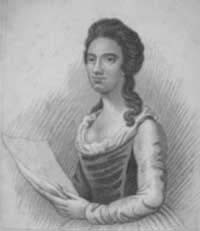Anne Steele's father William was probably succeeded by Nathaniel Rawlings of Bourton on the Water who after labouring for five years with varied success went to Trowbridge in Wiltshire where he died in 1809 or 1810. He was succeeded by Josiah Lewis who was from the London church pastored by Benjamin Wallin (1711-1782) Maze Pond and was educated by Dr Samuel Stennett (1727-1795) and his predecessor Dr Thomas Llewellyn (1720-1793).
He was first settled at Smarden, Kent, but left there and came to Broughton in 1778, the year that Anne Steele died. He was said to be "a man of distinguished learning, an able divine and preacher but of an unhappy temper," (William Steadman). During the first years of his ministry the church was prosperous and united but towards the close there was an unhappy reverse. A few of the members adopted the sentiments of Hyper Calvinism and others those of Sandemanianism. Though a superior scholar and preacher, Lewis was probably not the best qualified to still those disputes and in 1788 he resigned the pastoral office.
Amongst the Steele Papers in the Angus Library are
134. Josiah Lewis, “A Pious Memorial”
Ms vol entitled “A Pious Memorial”, containing
“The Mourner's Consolation: a discourse occasioned by the decease of Mrs Anne Steele of Broughton” [1778], and dedicated to her sister Martha Steele and nieces Maria, Anne and Martha Steele;
and “The Supports of Faith delineated: a discourse occasioned by the decease of William Steele [IV], esq., of Broughton [1785], and dedicated to his widow Martha Steele and her daughters Maria, Anne, and Martha Steele.
135. Josiah Lewis, “The Mourner's Consolation”
“The Mourner's Consolation: a discourse occasioned by the decease of Mrs Anne Steele of Broughton” [1778], and dedicated to her sister Martha Steele and nieces Maria, Anne and Martha Steele.
136. Josiah Lewis, “The Supports of Faith delineated”
“The Supports of Faith delineated: a discourse occasioned by the decease of William Steele [IV], esq., of Broughton [1785], and dedicated to his widow Martha Steele and her daughters Maria, Anne and Martha Steele.





